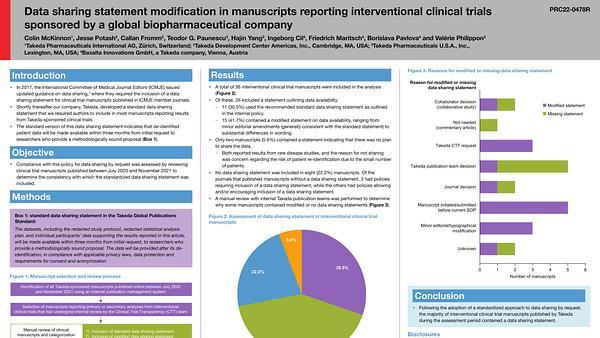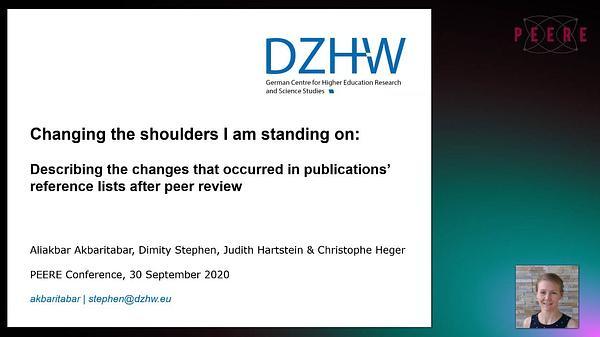Would you like to see your presentation here, made available to a global audience of researchers?
Add your own presentation or have us affordably record your next conference.
keywords:
and scientometrics
informatics
data sharing and access
citations and impact factor
bibliometrics
Objective Sharing data requested by contacting the corresponding author is a good practice in research integrity and highly expected by authors, but it can yield erratic results when used in systematic reviews.1Bibliometric factors are indirect measures of scientific report and research quality. The objective of this study was to assess whether bibliometric factors were associated with the availability and sharing of data requested for a previous systematic review.
Design This was an analysis of a cross-sectional study of studies included in a previous systematic review performed by the same author group in 2021, which was aimed to assess the prevalence of childhood obesity in Brazil.2Standard methods were followed for identifying and including studies, which were all assessed for methodological quality.2 In cases where data were needed for the analysis, the study’s authors were contacted and the outcome of the request was assessed.2,3 This analysis included studies with authors who were contacted to request needed data from April 2018 to May 2020.3The total number of citations on Google Scholar, the Journal Citation Reports 2020 Impact Factor (JIF), and the language(s) that the main report was published in were collected to September 2021. The outcome was success in receiving the requested data, and the association with studies’ bibliometric factors was investigated. The t test was used to assess the association of the outcome with the mean number of citations and JIF, and Pearson χ2 or Fishers exact tests were used to test for language. We used Stata, version 14.2 (StataCorp LLC) for all calculations.
Results Of the 9394 retrieved records, 163 study authors were contacted and 51 studies’ authors sent the requested data. The mean (SD) number of citations was higher in studies that failed to send data (50.5 63.0; 112 studies) than in studies that sent requested data (31.8 37.0; 51 studies), but this difference was not statistically different (P = .05). For 97 studies published in journals with a JIF, no difference was observed according to success (2.3 1.1; 31 studies) or failure (2.2 1.3; 66 studies) (P = .69). Success was significantly lower in studies published in Portuguese (28 of 109 studies 25.7%) than in other languages (23 of 54 studies 42.6%) (P = .03), and no difference in success was observed for studies published in English (33 of 94 studies 35.1% vs 18 of 69 studies 26.1%; P = .22) and Spanish (1 of 7 studies 14.3% vs 50 of 156 studies 32.1%; P = .44) in comparison with other languages (Table 57).

Conclusions Despite representing quality of scientific reporting, bibliometric factors such as number of citations and JIF were not associated with the success of obtaining data through contacting the author. Studies published in Portuguese were less likely to share the requested data, possibly reflecting less involvement in research dissemination. Availability of full data sets should be encouraged for all scientific publications to improve value and reduce waste on research.
References 1. Meursinge Reynders R, Ladu L, Di Girolamo N. Contacting of authors modified crucial outcomes of systematic reviews but was poorly reported, not systematic, and produced conflicting results. J Clin Epidemiol. 2019;115:64-76.
Ferreira CM, Reis NDD, Castro AO, et al. Prevalence of childhood obesity in Brazil: systematic review and meta- analysis. J Pediatr (Rio J). 2021;97(5):490-499.
Dutra dos Reis N, Müller Ferreira C, Silva MT, Galvão TF. Frequency of receiving requested data for a systematic review and associated factors: a cross-sectional study. Account Res. 2022;29(3):165-177.
Conflict of Interest Disclosures None reported.
Funding/Support This work was supported by the National Council for Scientific and Technological Development (CNPq) under grant 4408652017-4. Taís F. Galvão receives productivity scholarship from CNPq (grant 3064482017-7).


